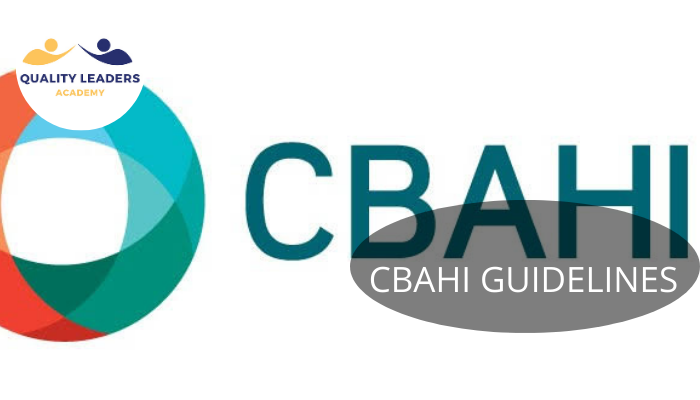The CBAHI guidelines serve as the foundation for healthcare accreditation in Saudi Arabia, ensuring that hospitals and medical centers meet stringent safety and quality standards. Developed by the Central Board for Accreditation of Healthcare Institutions (CBAHI), these guidelines help facilities enhance patient care, reduce medical errors, and improve overall healthcare services.
CBAHI’s primary goal is to create a healthcare system that prioritizes patient safety, efficiency, and continuous quality improvement. By implementing these guidelines, healthcare institutions can systematically assess their strengths and weaknesses, address gaps in care, and ensure adherence to internationally recognized best practices.
WHAT ARE CBAHI STANDARDS?

CBAHI standards are clear, measurable expectations that define the essential processes and structures required to deliver safe and effective healthcare. They are developed by experts in the field and serve as a benchmark for evaluating healthcare facilities.
The CBAHI guidelines categorize standards into three key types:
Structural standards:
Cover essential hospital infrastructure, including medical equipment, facility design, and staffing levels.
Procedural standards:
Focus on clinical processes such as patient assessment, treatment protocols, and medication administration.
Outcome standards:
Measure healthcare performance using indicators such as patient safety, infection control, and surgical success rates.
By adhering to these CBAHI guidelines, healthcare institutions can align with Saudi Arabia’s national healthcare vision while improving patient outcomes. Compliance with these standards ensures that hospitals and clinics provide a consistent level of high-quality care, leading to better patient experiences and improved trust in the healthcare system.
CBAHI’S ROLE IN HEALTHCARE ACCREDITATION
CBAHI was officially established in 2005 to oversee healthcare accreditation in Saudi Arabia. In 2013, a Council of Ministers mandate made CBAHI accreditation a national requirement for all healthcare facilities. This ensures that hospitals and clinics comply with high-quality standards, leading to improved healthcare services across the Kingdom.
Accreditation is not just about meeting requirements; it is a continuous process of improvement. To maintain their accreditation status, facilities must undergo regular self-assessments and external surveys. This process helps identify areas for improvement and encourages hospitals to adopt the latest advancements in medical care and patient safety.
HOW ACCREDITATION BENEFITS HEALTHCARE FACILITIES
Achieving accreditation under CBAHI guidelines provides numerous benefits, including:
Strengthening organizational structure and leadership:
Accreditation establishes clear governance models and management systems, ensuring that healthcare institutions function efficiently.
Enhancing patient safety:
By minimizing risks and reducing medical errors, CBAHI guidelines help protect patients from preventable harm.
Boosting public confidence:
When a healthcare facility is accredited, it signals to the community that it meets high standards of care, improving trust and reputation.
Providing objective evaluations:
Accredited facilities receive assessments from expert surveyors who offer valuable insights for further improvement.
Encouraging efficiency and lean healthcare practices:
Accreditation promotes better resource allocation, reducing waste and optimizing service delivery.
Increasing competitiveness in the healthcare sector:
Accredited facilities attract more patients and secure a stronger market position.
Aligning with Ministry of Health regulations:
The Saudi Ministry of Health is linking CBAHI accreditation to licensing, making compliance a necessity for healthcare providers.
Facilitating insurance reimbursements:
Many insurers require accreditation as a condition for reimbursement, benefiting both hospitals and patients.
Promoting continuous quality improvement:
Accreditation encourages ongoing monitoring and enhancement of healthcare services.
Providing educational opportunities:
Staff training and development are integral to CBAHI accreditation, ensuring that healthcare professionals stay updated on best practices.
KEY DIFFERENCES BETWEEN CBAHI AND JCI
While both CBAHI (Central Board for Accreditation of Healthcare Institutions) and JCI (Joint Commission International) aim to improve healthcare standards, they differ in scope and jurisdiction:
- CBAHI is a national accreditation body focused on Saudi Arabia’s healthcare sector.
- JCI is an international organization that accredits hospitals globally.
Many Saudi hospitals pursue both CBAHI and JCI accreditation to meet both national and international quality benchmarks. However, CBAHI standards are specifically tailored to align with Saudi Arabia’s healthcare policies and regulations, making them more relevant for local institutions.
ESSENTIAL SAFETY REQUIREMENTS (ESR) IN CBAHI
The CBAHI guidelines require healthcare facilities to comply with Essential Safety Requirements (ESR), which focus on:
- Patient safety: Establishing protocols to prevent errors and adverse events.
- Infection prevention: Implementing strict hygiene and sterilization measures.
- Medication management: Ensuring safe prescription, administration, and storage of medications.
- Emergency preparedness: Developing response plans for medical crises and disasters.
Facilities must continuously meet these ESRs to maintain their CBAHI accreditation status. Failure to do so may result in corrective actions or loss of accreditation, emphasizing the importance of ongoing compliance.
THE IMPACT OF CBAHI GUIDELINES ON PATIENT SAFETY
CBAHI accreditation significantly enhances patient safety by:
- Standardizing healthcare practices: Clear guidelines ensure uniformity in patient care.
- Reducing preventable medical errors: Training and adherence to safety protocols minimize the risk of errors.
- Ensuring compliance with evidence-based safety protocols: Hospitals must implement the latest, research-backed safety measures.
- Promoting a culture of accountability and continuous improvement: Healthcare professionals are encouraged to identify and address potential risks proactively.
INTERNATIONAL PATIENT SAFETY GOALS (IPSG)
CBAHI aligns with JCI’s 6 International Patient Safety Goals (IPSG), which include:
- Correctly identifying patients: Ensuring the right treatment is given to the right patient.
- Enhancing communication among healthcare providers: Reducing misunderstandings and improving coordination.
- Improving medication safety: Minimizing prescription and administration errors.
- Ensuring surgical safety: Following standardized procedures to prevent complications.
- Preventing healthcare-associated infections: Implementing strict hygiene protocols.
- Reducing patient falls: Identifying high-risk patients and taking preventive measures.
ROLE OF CBAHI IN SAUDI ARABIA’S HEALTHCARE VISION

By implementing the CBAHI guidelines, Saudi Arabia ensures:
- A standardized healthcare system: Hospitals across the country follow the same high-quality care principles.
- Improved healthcare service delivery: Accreditation drives better patient experiences and treatment outcomes.
- Greater patient trust: People feel more confident seeking care in accredited hospitals and clinics.
Saudi Arabia’s Vision 2030 prioritizes healthcare transformation, and CBAHI accreditation plays a crucial role in achieving this goal. By ensuring compliance with rigorous standards, CBAHI helps build a world-class healthcare system that meets both national and international expectations.
The CBAHI guidelines play a crucial role in shaping the healthcare landscape in Saudi Arabia. By maintaining strict accreditation standards, CBAHI ensures that healthcare facilities prioritize patient safety, enhance service quality, and align with national healthcare goals. As accreditation becomes a mandatory requirement, hospitals and clinics must continuously strive for excellence, ultimately leading to a safer and more efficient healthcare system in the Kingdom.
For healthcare providers, CBAHI accreditation is more than just a certification it is a commitment to delivering high-quality, patient-centered care. By embracing these guidelines, hospitals and medical centers can enhance their reputation, improve operational efficiency, and contribute to the overall well-being of Saudi society.
Read also:
Resources:
https://portal.cbahi.gov.sa/english/faq
https://portal.cbahi.gov.sa/english/accreditation/about-accreditation


